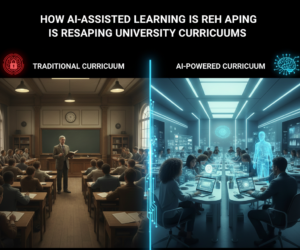Interdisciplinary studies are becoming more important in the construction of future careers.

Interdisciplinary studies are becoming more important in the construction of future careers.
In the past, the road that people took to pursue further education and their careers was often quite simple: they would study a certain topic, specialize in that field, and then seek out employment in a job that was connected to their area of expertise. Nevertheless, the borders that separate the different academic fields are becoming less distinct in the current day and age. The world we live in today is one where answers to problems are seldom found in a single field of expertise. This is due to the influence of technology, globalization, and the ever-changing societal issues that we face. Rather than that, the professionals who are the most creative and resilient are the ones who are able to integrate information, bridge disciplines, and apply a wide range of viewpoints. This is where interdisciplinary studies come into play—they provide a strong method for getting students ready to face the challenges of today’s job.
1. What Exactly Are Interdisciplinary Studies?
When dealing with complicated issues, interdisciplinary studies include the incorporation of concepts, methodologies, and viewpoints from a variety of different academic disciplines. Students are encouraged to make links across several fields of study rather than concentrating on a single topic. Examples include merging computer science with psychology or integrating economics with environmental science.
2. Why Specialization in Traditional Fields Is Insufficient in the Modern Day
Although deep knowledge is still considered to be very important, there are a number of areas in which individuals who are able to work across disciplines are now in demand. For instance, an engineer would need familiarity with environmental legislation, while a healthcare professional might be required to have an understanding of data analytics. Interdisciplinary courses give the breadth and flexibility that are necessary to succeed in these types of professions.
3. Flexibility is a must for those in the work force
In today’s world, the labor market is always changing. New professions arise, industries advance, and technology revolutionizes the way that labor is done. Graduates with interdisciplinary degrees are often more adaptable due to the fact that they have received training in flexible thinking, information synthesis, and context switching. This is a significant benefit in times of uncertainty.
4. Innovation Occurs When Different Fields of Study Interact
When different academic fields come into contact with one another, a large number of revolutionary inventions come to light. When considering the concept of a fusion of domains, one may consider biotechnology, digital humanities, or artificial intelligence in healthcare. Interdisciplinary studies foster the capacity to make these linkages and drive advancement in areas where standard boundaries are insufficient.
5. The ability to solve problems is improved by having skills in several disciplines.
It is impossible to address complex concerns that affect the whole world, such as climate change, cybersecurity, and public health, from a single viewpoint alone. Students who participate in interdisciplinary education are taught how to examine issues from a variety of perspectives, assess a wide range of solutions, and carry out tactics that take into consideration the linked realities of the world around them.
6. People Who Can Think Across Disciplines Are Highly Valued by Employers
Employers are increasingly seeking for people that have the ability to work with others across departments and interact with coworkers who come from a variety of backgrounds. Graduates in interdisciplinary programs possess excellent critical thinking abilities, great soft skills, and the capacity to serve as intermediaries across teams, making them highly marketable.
7. The Growing Popularity of Hybrid Career Paths
The conventional classification system is not enough for the categorization of the majority of current occupations. The fields of technology, psychology, and business are all combined in the practice of digital marketing. The fields of behavioral science, computer science, and art are all combined in user experience (UX) design. The importance of multidisciplinary training in the development of professional pathways that provide a variety of options is emphasized by these hybrid disciplines.
8. Interdisciplinary studies promote the idea of lifelong learning.
When students get training in connecting several subjects of study, they are more inclined to adopt a mindset of continual learning. They are more flexible when it comes to adapting to new technologies, cultural upheavals, and shifting professional expectations due to the fact that they see information as being interrelated.
9. Collaborative Perspectives Are Necessary for Addressing Global Challenges
Interdisciplinary methods are required for addressing issues such as climate change, social injustice, and sustainable development. In order to provide solutions that will be beneficial, professionals need to have an understanding of the scientific, economic, political, and cultural components of these issues. When it comes to educating students for the challenges that this complexity presents, higher education is essential.
10. Interdisciplinary research broadens horizons in academic fields
Interdisciplinary research centers, which are places where students and staff from many areas work together, are becoming more and more popular at universities. Innovation is encouraged in this setting, and students get experience in understanding how information from a variety of subjects contributes to solutions to problems that arise in the real world.
11. The Development of Skills That Are Transferable
An interdisciplinary education is beneficial for the development of abilities including creative thinking, communication, teamwork, and analytical thinking. The skills that graduates acquire are transferable across sectors, which ensures that they will not be confined to a small number of chances.
12. Technology as a Powerful Influence in Promoting Integration
Boundaries are inevitably crossed by technologies that are only now beginning to emerge. To provide an example, the field of artificial intelligence incorporates the disciplines of computer science, linguistics, ethics, and law. Graduates with interdisciplinary degrees are better equipped to traverse these intersections and take on leadership roles in technology-driven companies.
13. Getting students ready for jobs that have not yet been created
It is possible that some of the most sought-after employment opportunities of the future may not yet exist. Students who get instruction in interdisciplinary subjects are able to adapt to new sectors that are developing and produce value in new locations, even when the future is unknown.
14. Ways for Students to Embrace Interdisciplinary Learning
Students have the option to pursue interdisciplinary studies either officially via degree programs or informally by selecting a wide range of optional courses, participating in projects that include numerous departments, and looking for internships that integrate abilities from a number of different subjects. Success is primarily driven by two things: an inquisitive mind and a willingness to make connections.
Professionals who are able to think beyond borders, integrate different points of view, and innovate at the intersections of knowledge will be the ones who shape the future. Interdisciplinary studies are not only a passing academic fad; in a world that is always evolving, they constitute an essential component of professional life. Students that embrace this method of learning prepare themselves not only for the professions that exist now but also for the possibilities and problems that they will face in the future, which are currently unknown.




